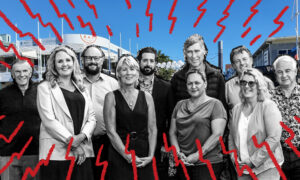I worked with the then Mayor of Tauranga, Stuart Crosby, and I always said that the City I would least like to be Mayor of was Tauranga. It’s full of retirees. Many of them successful (in the money sense) business people. They had a number of failings. One was they had too much time to focus on cost cutting at the Council. Another was that generally they had no idea about public finance. Another was that they were only interested in a very narrow group of items on the Council agenda. An area which would seldom be touched would be any expenditure on the Golf Course.
Consequently, this rag-tag and bob-tail group of citizens fought against rate increases. This resistance prevented the rapidly growing City to be able to afford essential infrastructure. They are now in a difficult financial position and the Minister of Local Government has appointed Commissioners to run the Council. Always beware of people who know nothing about public finance telling you that the only way to face the future is to lower rates, or taxes. Promotion of zero rates is a fraudulent, false marketing, way of deferring costs for another generation to bear.
The article below about a meeting of Tauranga ratepayers had the stink of racism, bigotry and just plain stupidity. Here’s the first few paragraphs:
Local government minister Nanaia Mahuta’s decision to sack the council was always going to cause a backlash. Many in the city believe the problems the council faced were either solvable, or left the building when former mayor Tenby Powell resigned. And while commissioner Anne Tolley and her colleagues have been seeking to reassure residents that the city is now on the right track, not everyone is convinced.

The Tauranga Ratepayers Alliance (TRA) has launched on the back of this anger, with a packed meeting on Wednesday night at Club Mount Maunganui. They lined the walls to hear an all-star lineup of the city’s political right fan the flames, and plot a return to power. Unlike a soporific council meeting, the room crackled with fury – a sentiment the speakers were happy to pick up and run with.
The meeting also had significant support from the Taxpayers Union and the Auckland Ratepayers Alliance. The TRA is billing itself as an independent local group, and it hasn’t yet been decided if they’ll stand candidates on a ticket in the 2022 election. Several ousted councillors have already pledged their support for the TRA, including a group that Powell accused of undermining him at every turn, as well as former mayor Greg Brownless.
Here was a meeting which reflects conservative politics at its worst. The sort which closes public libraries. Or spends nothing on art, or culture. Or proper spending on roads or pipes for that matter.
The writer of the article then made a fundamental error. He wrote:
In a city where property values are booming, rates rises are inevitable. But it’s the scale of the rises, coupled with the way they’re being implemented and sold to the public by commissioners, that is really getting people up in arms. Broadcaster Peter Williams, who was the MC on the night, opened the proceedings by saying he was “frankly bloody angry” at what he personally would be paying.
The first sentence is an error. Rates do not increase with property values. Rates are the way that the costs of running a Council are allocated. What drives rates are costs of infrastructure. The costs of oil. The cost of steel. The cost of concrete. Capital costs drive Council costs upwards. When pay increases are agreed that also drives up costs. There will be literally thousands of items which drive up the costs for Local Government.
When all of the projected costs for a Council are totted up, the way they fall as a cost to us individually will be driven by how each property has gone up in proportion to the City as a whole. It’s a complex formula. The reason why rates have been going up in Tauranga is that many of those who will be complaining will have been welcoming growth in their City. They have stood at the bar at the Golf Club and quietly taken pride in how much their home is compared to what they paid for it. The costs of growth in infrastructure are partially met by Development Contribution levies paid by developers, but these are never enough to cover all the costs.
The article continued:
Keeping rates down as a political shibboleth is only part of the reason why Tauranga has developed as it has. Because the active voting base (especially at the local level) tends to be older homeowners, city planning has long reflected their interests. Very few people live in the CBD, preferring to drive in and out from the vast surrounding suburbia. Urbanist critics would say a succession of short-sighted decisions made on behalf of these voters is a major cause of Tauranga’s now legendary traffic and housing problems, and to continue down that path just means more of the same.
One such critic is former councillor Terry Molloy, who has been fired and rehired multiple times by the voters over the last two decades before losing his seat for what he says will be the last time in the 2019 elections. He wants the commissioners to stay on beyond next year, to continue the work they’ve started, and said he hoped the councillors who had attached themselves to the Ratepayers Alliance wouldn’t get back in.
Tauranga is our warning. Beware of false prophets who promise low rates. When you drive over an uneven road, or your toilet doesn’t take what you left there, think about those who promised that they would support zero or low rates. They caused that.
Here’s the article: https://thespinoff.co.nz/politics/28-05-2021/the-angriest-room-in-the-country-tauranga-ratepayers-get-ready-to-fight-back-against-wellington/.
Leave a Reply